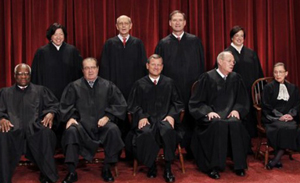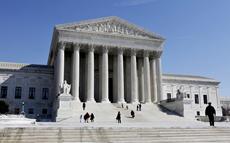Supreme Court opens big term
Daily News Article — Posted on October 2, 2012
(by Mark Sherman, WashingtonTimes.com) AP, WASHINGTON – The Supreme Court [began] its new term Monday…. The next nine months hold the prospect for major rulings on affirmative action, gay marriage and voting [ID laws].
The term that concluded in June set a high bar for drama and significance, and the new one holds considerable potential as well. Cases involving some of the most emotional issues in American life are likely to be decided after voters choose a president and new Congress next month.
Meeting on the first Monday in October, as required by law, the justices entered the crowded marble courtroom for the first time since their momentous decision in late June that upheld President Barack Obama’s health care overhaul [the law is also known as Obamacare].

An Oct. 8, 2010, group portrait of the justices of the U.S. Supreme Court at the Supreme Court Building in Washington, D.C. Seated from left to right are: Associate Justice Clarence Thomas, Associate Justice Antonin Scalia, Chief Justice John G. Roberts, Associate Justice Anthony M. Kennedy, Associate Justice Ruth Bader Ginsburg. Standing, from left are: Associate Justice Sonia Sotomayor, Associate Justice Stephen Breyer, Associate Justice Samuel Alito Jr., and Associate Justice Elena Kagan. (AP Photo)
Chief Justice John Roberts, who was the decisive vote in favor of Obamacare, was smiling as he led the justices into the courtroom just after 10 a.m. The conservative chief justice will be watched closely in the coming months for any new indications of a willingness to side with the court’s liberals, as he did in the health care case. …
Roberts formally opened the term, and the court turned quickly to its first argument, which could have far-reaching implications.
The dispute involves a lawsuit against Royal Dutch Petroleum, or Shell Oil, over claims that the company was complicit in murder and other abuses committed by the Nigerian government against its citizens in the oil-rich Niger Delta.
Human rights groups are warily watching the case because it would be a major setback if the court were to rule that foreign victims could not use American courts, under a 1789 law [the Alien Tort Statute], to seek accountability and money damages for what they have been through. …
Justice Samuel Alito said the Nigerian case has no connection to this country because the businesses, the victims and the location of the abuse all are foreign. “Why does this case belong in the courts of the United States?” Alito asked.
Among other concerns raised by the justices was the prospect that U.S. firms could “be sued in any country in any court in the world,” in Justice Anthony Kennedy’s words.
The Obama administration is partly on the oil company’s side in this case. “There just isn’t any meaningful connection to the United States,” Solicitor General Donald Verrilli Jr. said. …
The court first heard the case in February to consider whether businesses could be sued under the law. But the justices asked for additional arguments about whether the law could be applied to any conduct that takes place abroad.
A decision is expected by spring.
The first blockbuster case on the court’s calendar is Oct. 10, when the justices will hear arguments in a fight over the University of Texas’ affirmative action program. Texas uses multiple factors, including community service, work experience, extracurricular activities, awards and race, to help fill 20 to 25 percent of the spots in its freshman classes. The outcome could further limit or even end the use of racial preferences in college admissions.
The court also is expected to [address] gay marriage in some form. Several cases seek to guarantee federal benefits for legally married same-sex couples. A provision of the 1996 Defense of Marriage Act [DOMA, signed into law by President Clinton] prohibits same-sex couples from receiving a range of federal benefits available to heterosexual couples.
Several federal courts have agreed that the provision of the law is unconstitutional, a situation that practically ensures the high court will step in.
A separate appeal asks the justices to sustain California’s Proposition 8, the amendment to the state Constitution that defined marriage as between one man and one woman in the nation’s largest state. Federal courts in California have struck down the amendment. The justices may not consider whether to hear the gay marriage issue until November.
…..
Copyright 2012 The Washington Times, LLC. From the Associated Press. Reprinted from the Washington Times for educational purposes only. Visit the website at washingtontimes.com.
Among other important cases already on the court’s docket:
— A high-stakes dispute, to be argued first thing Monday, between the business community and human rights advocates over the reach of a 1789 law. The issue is whether businesses can be sued in U.S. courts for human rights violations that take place on foreign soil and have foreign victims.
— A challenge to the use of drug-sniffing dogs in two situations. Florida police used a marijuana-sniffing dog’s alert at the door of a private home to obtain a search warrant to look inside the house. The question is whether the dog’s sniff itself was a search. A separate case looks at the reliability of animals trained to pick up the scent of illegal drugs.
— A challenge to the detention of a man who police picked up a mile away from an apartment they had a warrant to search. Occupants of a home may be detained during the search for the safety of officers, but this case tests how far that authority extends away from the place to be searched.
— Environmental disputes involving runoff from logging roads in Oregon and water pollution in Los Angeles.
Background
On the Supreme Court from BensGuide.gpo.gov:
- Approximately 7,500 cases are sent to the Supreme Court each year. Out of these, only 80 to 100 are actually heard by the Supreme Court. When a case comes to the Supreme Court, several things happen. First, the Justices get together to decide if a case is worthy of being brought before the Court. In other words, does the case really involve Constitutional or federal law? Secondly, a Supreme Court ruling can affect the outcome of hundreds or even thousands of cases in lower courts around the country. Therefore, the Court tries to use this enormous power only when a case presents a pressing constitutional issue. …
- The Supreme Court convenes, or meets, the first Monday in October. It stays in session usually until late June of the next year. When they are not hearing cases, the Justices do legal research and write opinions. On Fridays, they meet in private (in “conference”) to discuss cases they’ve heard and to vote on them. …
- Most cases do not start in the Supreme Court. Usually cases are first brought in front of lower (state or federal) courts. Each disputing party is made up of a petitioner and a respondent.
- Once the lower court makes a decisions, if the losing party does not think that justice was served, s/he may appeal the case, or bring it to a higher court. In the state court system, these higher courts are called appellate courts. In the federal court system, the lower courts are called United States District Courts and the higher courts are called United States Courts of Appeals.
- If the higher court’s ruling disagrees with the lower court’s ruling, the original decision is overturned. If the higher court’s ruling agrees with the lower court’s decision, then the losing party may ask that the case be taken to the Supreme Court. But … only cases involving federal or Constitutional law are brought to the highest court in the land.
EXPLANATION OF PROCEDURE FOR ORAL ARGUMENTS IN THE SUPREME COURT:
(from supremecourt.gov/visiting/visitorsguidetooralargument.aspx)
- A case selected for argument usually involves interpretations of the U. S. Constitution or federal law. At least four Justices have selected the case as being of such importance that the Supreme Court must resolve the legal issues.
- An attorney for each side of a case will have an opportunity to make a presentation to the Court and answer questions posed by the Justices. Prior to the argument each side has submitted a legal brief – a written legal argument outlining each party’s points of law. The Justices have read these briefs prior to argument and are thoroughly familiar with the case, its facts, and the legal positions that each party is advocating.
- Beginning the first Monday in October, the Court generally hears two one-hour arguments a day, at 10 a.m. and 11 a.m., with occasional afternoon sessions scheduled as necessary. Arguments are held on Mondays, Tuesdays, and Wednesdays in two-week intervals through late April (with longer breaks during December and February). The argument calendars are posted on the Court’s Website under the “Oral Arguments” link. In the recesses between argument sessions, the Justices are busy writing opinions, deciding which cases to hear in the future, and reading the briefs for the next argument session. They grant review in approximately 100 of the more than 10,000 petitions filed with the Court each term. No one knows exactly when a decision will be handed down by the Court in an argued case, nor is there a set time period in which the Justices must reach a decision. However, all cases argued during a term of Court are decided before the summer recess begins, usually by the end of June.
- During an argument week, the Justices meet in a private conference, closed even to staff, to discuss the cases and to take a preliminary vote on each case. If the Chief Justice is in the majority on a case decision, he decides who will write the opinion. He may decide to write it himself or he may assign that duty to any other Justice in the majority. If the Chief Justice is in the minority, the Justice in the majority who has the most seniority assumes the assignment duty.

